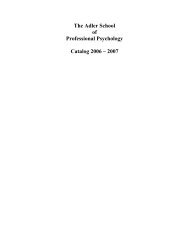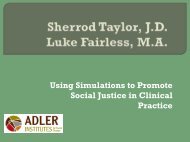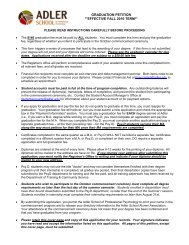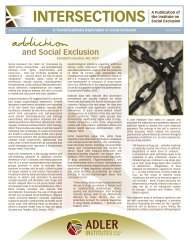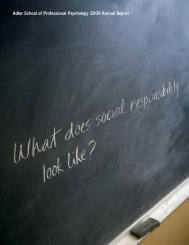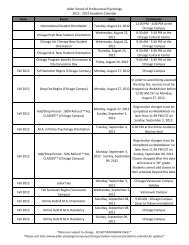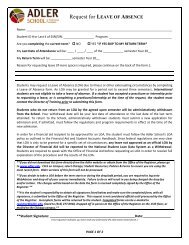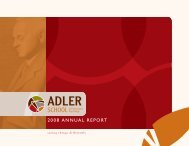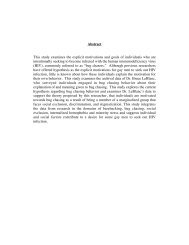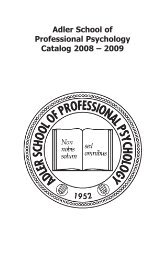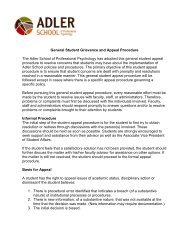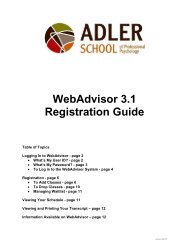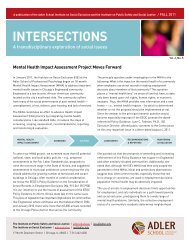INTERSECTIONS - Adler School of Professional Psychology
INTERSECTIONS - Adler School of Professional Psychology
INTERSECTIONS - Adler School of Professional Psychology
You also want an ePaper? Increase the reach of your titles
YUMPU automatically turns print PDFs into web optimized ePapers that Google loves.
conditions (a social determinant) which, in turn, impacts mental<br />
health outcomes. For instance, high rates <strong>of</strong> unemployment<br />
have deleterious impacts on “social capital”, “psychological<br />
sense <strong>of</strong> community” and, as a consequence, on the collective<br />
mental health and well-being <strong>of</strong> communities which may<br />
manifest high rates <strong>of</strong> mental health services utilization,<br />
substance abuse, depression/anxiety, and family violence.<br />
Even when employers do not wrongly apply the current EEOC<br />
guidance, this policy may produce adverse unintended effects on<br />
marginalized populations. Believing that it is lawful for<br />
employers to inquire about arrest records, members <strong>of</strong> legally<br />
protected minority groups may forego applying for available jobs<br />
because they are under the false impression that employers are<br />
well within their rights to inquiry about arrest records and are<br />
unlikely to hire someone with an arrest record – even if that<br />
arrest did not result in a charge or conviction. In this way, the<br />
current policy, as understood by potential job seekers, may well<br />
have a “chilling” effect among people who most are in need <strong>of</strong><br />
employment and its benefits (e.g., health insurance).<br />
At this time, the scoping phase <strong>of</strong> the MHIA project has been<br />
completed. During this phase, the ISE team formulated a<br />
series <strong>of</strong> research questions to guide the assessment process;<br />
identified health impacts to be considered; research<br />
methodologies; data sources; the demographic, geographical<br />
and temporal boundaries for impact analysis; and developed<br />
a work plan to guide the assessment process. Presently,<br />
we are engaged in the early portion <strong>of</strong> the assessment phase,<br />
collecting data from focus groups, community surveys, and<br />
interviews. That data will be used to determine the mental<br />
health implications <strong>of</strong> the proposed revision to the<br />
aforementioned EEOC Policy guidance. The results <strong>of</strong> the<br />
assessment will be used to develop the MHIA recommendations<br />
regarding the proposed policy revision and will be reported out<br />
to various stakeholder interests including Englewood residents,<br />
public <strong>of</strong>ficials, legislators and others.<br />
The MHIA project has been funded, in part, by the Robert Wood<br />
Johnson Foundation and the W.K. Kellogg Foundation. As<br />
described elsewhere in this newsletter, additional funding has<br />
recently been awarded by the Pierce Family Foundation.<br />
IN THE NEWS<br />
Expert Testifies on Mental Health Dangers <strong>of</strong> Vacant Houses<br />
On Wednesday, July 20, 2011, Dr. Lynn Todman, Executive<br />
Director <strong>of</strong> the <strong>Adler</strong> <strong>School</strong>’s Institute on Social Exclusion (ISE),<br />
testified before the Chicago City Council Joint Committee on<br />
Housing and Real Estate and Zoning, Landmarks and Building<br />
Standards which was examining proposed changes to the city’s<br />
Vacant Buildings Ordinance. Dr. Todman, a trained urban<br />
planner and a member <strong>of</strong> the city’s Community Development<br />
Commission, spoke in support <strong>of</strong> Amendment <strong>of</strong> Chapter 13-12<br />
<strong>of</strong> Municipal Code concerning maintenance and security <strong>of</strong><br />
vacant foreclosed housing in Chicago. Proposed amendment<br />
would require designate banks as owners <strong>of</strong> the properties<br />
their foreclose on and increase fees for registering vacant<br />
properties with the city’s and fines for non-compliance to<br />
requirements to pays fees and to maintain and secure their<br />
foreclosed properties.<br />
Dr. Todman was interviewed by WBBM Radio Chicago regarding<br />
her testimony. She explained that the ISE had conducted an<br />
assessment <strong>of</strong> the likely effects <strong>of</strong> the proposed ordinance<br />
change on the mental health <strong>of</strong> the residents <strong>of</strong> the Englewood<br />
community. The City Council passed the amendment into law<br />
on July 28. Most recently, in October the Council weakened the<br />
legislation under pressure from the banks.<br />
To learn more, go to: http://chicago.cbslocal.com/2011/07/20/<br />
expert-to-testify-on-dangers-<strong>of</strong>-vacant-houses/<br />
page 2



